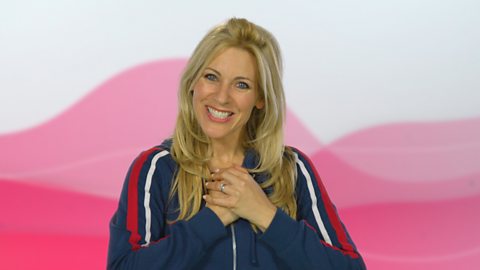Gully the Seagull:
OK, Super Movers, let's learn howto stay fit and well
Have you ever felt bored, ever felt floppy?
No energy
Have you felt a bit sloppy?
Here's some ideas that maybe you can copy
We'll move right to the beat
So take a deep breath and smell the fresh air,
move out the door, feel the wind in your hair
Call up some friends to see if they're there
To move it to the beat
So you need energy
Well, what can you do?
You can eat the right foods that are good foryou
We're powering up now, what do you know?
One, two, three, four, five. Let's go
Running, skipping, dancing, hopping
Bouncing, jumping, body popping
Wriggle your body now we're never stopping
Moving to the beat
Munching, chewing, healthy eating
Washing, brushing, virus beating
Taking some time for chilling and sleeping
That's a great way to be
Flop, flop, flop, flop
Floppity, floppity, floppity
Bop, bop, bop, bop
Boppity, boppity, boppity, boppity
Giddy up, giddy up, giddy up, giddy up
Giddy up, giddy up, giddy up, giddy up
Giddy up, giddy up, giddy up, giddy up
Giddy up, giddy up,
Giddy up
Have you ever been ill so you ache and squirm?
That's because of these things called germs
They make you ill if you don't stay clean
Wash right to the beat
Wash and rinse and clean and scrub
Use that soap sing a rub a dub dub
Clean those teeth so they're nice and clean
Brushing to the beat
Move, move, move
Grove, groove, groove
Boosting our brains with Super Moves
We're powering up now
What do you know
One, two, three, four, five
Let's go
Running, skipping, dancing, hopping
Bouncing, jumping, body popping
We're getting tired
But we're never flopping
Moving to the beat
Munching, chewing, healthy eating
Washing, brushing, virus beating
I think it's bedtime for chilling and sleeping
Let's all get some sleep
Oh lovely sleep
[snoring sound]
So snuggle down tightly and have a great sleep
Take some deep breaths and count some sheep
If you can keep yourself well and be kindto yourself
You can be happy and look after health.
Brighton & Hove Albion mascot Gully the Seagull performs this upbeat Super Mood Movers song about the importance of staying fit and well.
After viewing, singing and dancing along, your class could try some of these activities to further explore their learning:
Activities
- Why is it important to keep fit?: Ask: 'What does keeping fit mean? Why is it important to keep fit?' Guide the pupils' responses to make these points: to stay fit we need to do things that make us a little out of breath, such as running, dancing and playing. This helps us stay strong and healthy, so we can do all the things we want to in life.
- Mood boost chart: Begin with, 'Keeping fit and active can help us feel better and feel happier too. Fitness can help our mental wellbeing and boost our mood.' Ask children to try some five-minute activities over five days (e.g. a ball game, a race, a dance routine, star-jumps, hula hooping). After each activity, they should award it 1-5 happy faces on their charts to show how much they felt the activity boosted their mood. The class could share charts at the end of the week. Which activities were the biggest mood boosters?
- Storyboard: Ask pupils to draw a storyboard (or comic strip) showing different times in their day which offer ways to stay fit and well. They might show themselves cleaning their teeth after breakfast, for instance, or walking to school, or running a race at playtime. This activity fits well with learning to tell the time: pupils could add a clock face to each picture in their storyboard.
- Duck Duck Goose: Play a game of Duck Duck Goose with the class. Players sit in a circle. One player walks around the outside of the circle, tapping each person on the shoulder and saying 'duck'. If the player says 'goose' instead? The person tapped chases the first player around the circle trying to tag them. If the first player makes it all the way around the circle to sit in the empty space, the chaser restarts the game.
- Active fun: Ask - 'Can you think of any games that need you to move about and be very active?' Children could name, describe and play some games, for instance: keep a balloon in the air, hide and seek, hop-scotch, Grandmother's Footsteps, What's the time Mr Wolf? and tag.
- Invent a game: Give pairs or groups of children a simple object (a bean bag, a ball, a balloon, a hoop) and ask them to invent an active game that other children can play. They could agree some rules, draw or write instructions and finally demonstrate their game to the class. Children could take turns to try each other's active games.
- Super Movers: Children could view the 91Čȱ¬ Super Movers videos (for English and maths) and choose some singing and dancing routines to include in the coming week's lessons.
- Soap and water chant: Ask pupils to sit in a circle and mime washing their hands with soap and water. Give them a chorus to chant: 'Soap and water, soap and water! Wash our hands the way we ought to'. Then let children take turns to contribute to a structured verse: 'If we've been … What should we do? To keep ourselves clean, both me and you?' So for example: 'If we've been taking out the rubbish / What should we do? To keep ourselves clean, both me and you?'' The circle can then reply with the chorus. Finish off the activity with, 'Dry them now and show me those lovely clean hands.'
- Eating well Ask - 'Which foods do you think are good for you?' Pupils could draw or paint foods such as fruit and vegetables. Ask: 'Which foods are not so good for you?' Pupils could draw cakes and sweets. Establish that when we eat well, we have plenty of fruit and vegetables and not too many cakes and sweets.
- Sleeping lions: Use this 'winding down' activity to end a busy school day and to illustrate the importance of getting a good night's sleep. Ask the children to lie down and be 'sleeping lions'. They must stay completely still. If you spot anyone moving, ask them to sit at one side and help you spot anyone else who moves. When the children are still, ask them to think about going to bed, reading or listening to a story, closing their eyes, settling down, breathing deeply and getting themselves ready, like the lions, for a good night's sleep so they will be rested and ready for all the running about and roaring that tomorrow will bring.
Learning aims or objectives
The Super Mood Movers song Fit And Well and these activity notes address the following learning objectives from the curriculum guidance of the four UK nations.
England, PHSE and RSE
From the PSHE Association programme of study:
- H1. about what keeping healthy means; different ways to keep healthy.
- H2. about foods that support good health and the risks of eating too much sugar.
- H3. about how physical activity helps us to stay healthy; and ways to be physically active everyday.
- H4. about why sleep is important and different ways to rest and relax.
- H5. simple hygiene routines that can stop germs from spreading.
- H7. how to brush teeth correctly.
From the RSE guidance:
- Physical health and fitness:
- The characteristics and mental and physical benefits of an active lifestyle.
- The importance of building regular exercise into daily and weekly routines and how to achieve this; for example walking or cycling to school, a daily active mile or other forms of regular, vigorous exercise.
- Healthy eating:
- What constitutes a healthy diet.
- Health and prevention:
- The importance of sufficient good quality sleep for good health.
- About dental health and the benefits of good oral hygiene.
- About personal hygiene and germs including bacteria, viruses, how they are spread and treated, and the importance of hand-washing.
Northern Ireland, PD&MU
From the Northern Ireland curriculum for Personal Development and Mutual Understanding:
- Health growth and change: Foundation Stage (Strand 1):
- The importance of keeping healthy.
- Be aware of how to care for their body in order to keep it healthy and well.
- Recognise and practise basic hygiene skills.
- Key Stage 1 (Strand 1):
- Strategies and skills for keeping healthy.
- Recognise and value the options for a healthy lifestyle including the benefits of exercise, rest, healthy eating and hygiene.
- Have respect for their bodies and those of others.
Scotland, PSE
From the Education Scotland Personal and Social Education benchmarks:
- Health and wellbeing (First level):
- Diet, rest and sleep: I am aware of the role physical activity plays in keeping me healthy and know that I also need to sleep and rest to look after my body (HWB 1-27a).
- I understand that my body needs energy to function and that this comes from the food that I eat. I am exploring how physical activity contributes to my health and wellbeing (HWB 1-28a).
- Physical changes: I am learning what I can do to look after my body (HWB1-48a).
Wales, PSE
From the Personal and Social Education Framework for 7 to 19-year-olds in Wales:
- Health and emotional well-being:
- Take increasing responsibility for keeping the mind and body safe and healthy.
- Feel positive about themselves and be sensitive towards the feelings of others.
- To understand the features and physical and emotional benefits of a healthy lifestyle, e.g. food and fitness.
- What to do or to whom to go when feeling unsafe.

More from Super Mood Movers:
Taking care of our world. video
Pudsey and Karim Zeroual perform this larger-than-life Super Mood Movers song about the importance of taking care of the world around us.

Friends and family. video
Pudsey performs this toe-tapping Super Mood Movers song which offers a huge 'big up' to our friends and family.

Coping with feelings. video
Rhys Stephenson performs this touching Super Mood Movers song about different feelings.

Being happy and safe. video
Naomi Wilkinson performs this uplifting Super Mood Movers song about being happy and staying safe.

Ways to learn and play. video
Rhys Stephenson performs this energetic Super Mood Movers song about learning through play.
